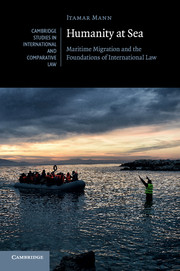Book contents
- Frontmatter
- Dedication
- Epigraph
- Contents
- List of Figures
- Acknowledgments
- Introduction: Humanity Washed Ashore
- 1 Flagless Vessel
- 2 What Is a Human Rights Claim?
- 3 What Is a Human Rights Commitment?
- 4 Between Moral Blackmail and Moral Risk
- 5 The Place Where We Stand
- 6 Imagination and the Human Rights Encounter
- Conclusion: The Dual Foundation of International Law
- Postscript
- Index
- CAMBRIDGE STUDIES IN INTERNATIONAL AND COMPARATIVE LAW
6 - Imagination and the Human Rights Encounter
Published online by Cambridge University Press: 05 September 2016
- Frontmatter
- Dedication
- Epigraph
- Contents
- List of Figures
- Acknowledgments
- Introduction: Humanity Washed Ashore
- 1 Flagless Vessel
- 2 What Is a Human Rights Claim?
- 3 What Is a Human Rights Commitment?
- 4 Between Moral Blackmail and Moral Risk
- 5 The Place Where We Stand
- 6 Imagination and the Human Rights Encounter
- Conclusion: The Dual Foundation of International Law
- Postscript
- Index
- CAMBRIDGE STUDIES IN INTERNATIONAL AND COMPARATIVE LAW
Summary
On September 9, 2015, President of the European Commission Jean-Claude Juncker delivered his State of the Union address. Entitled Time for Honesty, Unity, and Solidarity, the speech was pitched as a heroic intervention in a situation of crisis. At its center was an imagined encounter between Europe and destitute refugees clamoring at its doorstep.
Juncker spoke against the backdrop of a long and dramatic summer. The European Union (EU) was “witnessing perhaps the largest scale of immigration wave ever”: from January to the end of August, 300,000 refugees and migrants attempted the Mediterranean crossing, with approximately 200,000 of them landing in Greece and 110,000 in Italy. Migrants and refugees were accompanied by a continuous flow of news and macabre images. While some families tried to make their way under barbed wire fences in the Balkans, others traveled as far as the Arctic Circle to enter Europe. Countless migrant boats drowned off in Mediterranean waterways. A refrigerated truck abandoned outside of Vienna with seventy-one migrant bodies on board generated headlines globally. Perhaps the most iconic image was that of the body of a toddler, lying face down on a sandy beach on Turkey's Aegean coast.
This final chapter offers a critical analysis of Juncker's speech. Unlike previous chapters, it will not be organized around physical encounters between migrants at sea and border-enforcement agents or other seafarers. As Chapter 5 explains, I doubt any such encounter can be severed from the political and economic environment in which it is constructed. But this does not diminish the importance of the imagination of such an encounter for international legal theory. In previous chapters, I argued that the conception of the human rights encounter provides a useful interpretation of historical experience that constitutes human rights law: a non-positive set of imperatives both ethical and legal, independent of sovereignty and of state consent. In this chapter, I will emphasize that the human rights encounter is a fruit of the political imagination. Understanding this, however, does not diminish its binding normative force.
The previous chapters present a phenomenological and descriptive effort to understand how human rights law, properly conceived, plays an essential part in international law.
- Type
- Chapter
- Information
- Humanity at SeaMaritime Migration and the Foundations of International Law, pp. 187 - 210Publisher: Cambridge University PressPrint publication year: 2016



